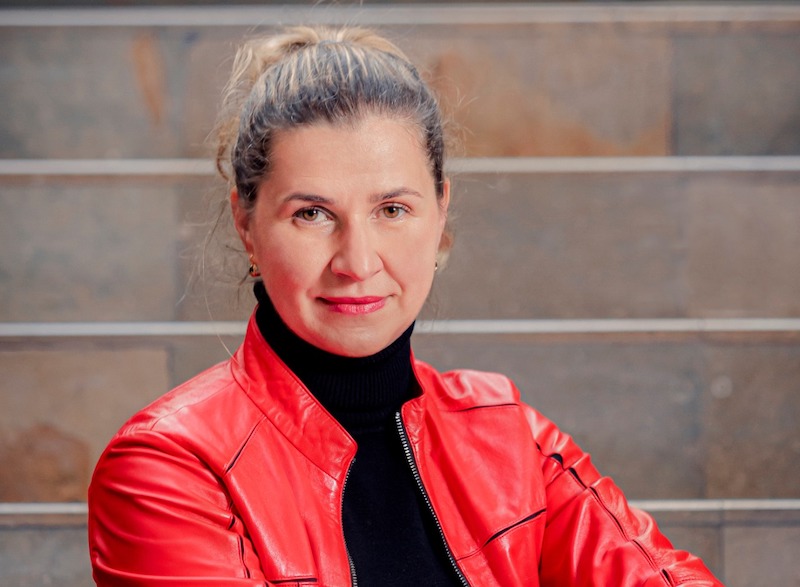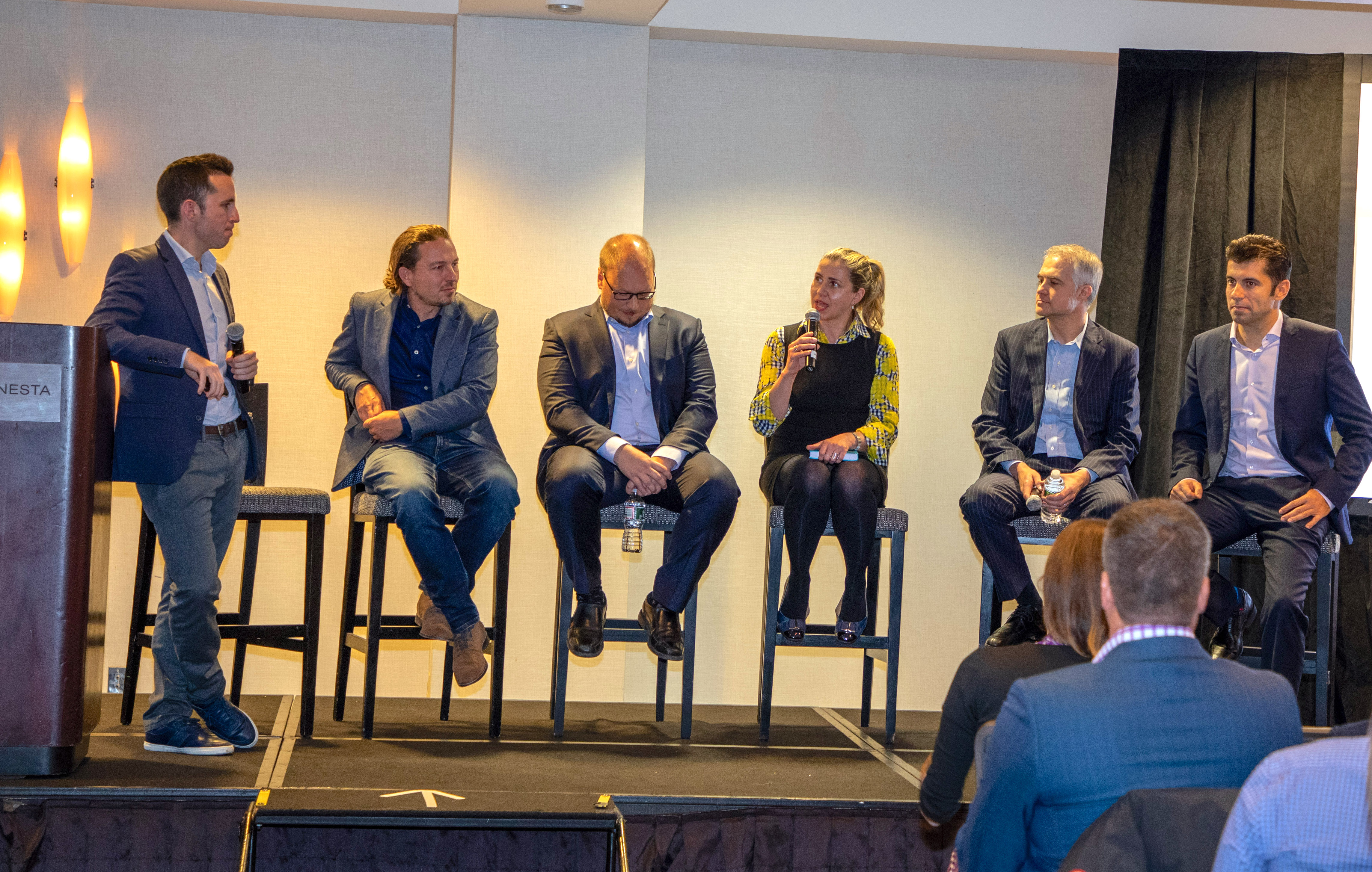 RE:TURN aims to create a bridge between Bulgaria and Bulgarians abroad—a subject Veneta Andonova has a professional interest in. An author and professor of business strategy and entrepreneurship, Veneta studies the role of Bulgarian communities abroad in the economic development of their birth country. Her latest book, Entrepreneurial Ecosystems in Unusual Places (Palgrave, 2019), examines how Bulgarian returnees promote an entrepreneurial culture and invest in new businesses in Bulgaria and the region.
RE:TURN aims to create a bridge between Bulgaria and Bulgarians abroad—a subject Veneta Andonova has a professional interest in. An author and professor of business strategy and entrepreneurship, Veneta studies the role of Bulgarian communities abroad in the economic development of their birth country. Her latest book, Entrepreneurial Ecosystems in Unusual Places (Palgrave, 2019), examines how Bulgarian returnees promote an entrepreneurial culture and invest in new businesses in Bulgaria and the region.
At the RE:TURN events on the US East Coast in November 2019, she met Bulgarian expats who are “very keen to help Bulgaria… This kind of collective enthusiasm [among the Bulgarian community abroad] was very new to me. It wasn’t something I had experienced before.”
Veneta was born in Bulgaria and educated in Bulgaria and Spain. She has taught at the American University in Bulgaria, the Mexico Autonomous Institute of Technology, and the University of Los Andes in Bogota, Colombia, where she also serves as the dean of the business administration department. She has been a mentor in startups and entrepreneurship programs. Her other book explores Latin American multinationals, the so-called multilatinas.
RE:TURN is a collaboration between the Bulgarian Private Equity and Venture Capital Association (BVCA), which represents venture capital funds in Bulgaria, and Bulgaria’s largest philanthropic foundation, the America for Bulgaria Foundation. In November, the RE:TURN team met with over 600 successful Bulgarians in Washington, DC, New York, and Boston to tell them about the many investment opportunities Bulgaria offers today. Veneta Andonova was a guest speaker at the meetups in Washington and Boston.
The success of investment funds and the startup ecosystem in Bulgaria is the topic of your book Entrepreneurial Ecosystems in Unexpected Places: Examining the Success Factors of Regional Entrepreneurship, co-authored by Milena Nikolova and Dilyan Dimitrov. Why unexpected? Is Bulgaria an unusual place to do business?
There are very few people in Bulgaria who are ready to start new companies, compared to the rest of the world. We are always in the top 3 of countries where people are least likely to become entrepreneurs. This does not create great conditions for the development of entrepreneurship in Bulgaria.
We also see a clear tendency for brain drain; that is, the pool of people who create businesses is diminishing. We do not expect those who open a small restaurant to change anything in the country, but those who have the potential to create innovations in the fields of medicine, biotechnology, and computer technology can have a truly great impact. We don’t have that many of those in Bulgaria.
Because of the legacy of our recent past, we also tend to go into fields that turn us into wage earners; that is, on a cultural level, entrepreneurship is perceived by the older generation as an unnecessary risk.
Taken together, these characteristics—and these are characteristics of the entire region, not just Bulgaria—show that what makes other regions so dynamic is, in fact, missing in Bulgaria. However, when you look at the level of ecosystems—what happens in certain places thanks to a small number of people, but people who are connected to global networks—then things start to look different. Our book says that the way we “measure” entrepreneurship forces us into frameworks and paradigms that are appropriate for exploring mature ecosystems such as Israel’s and others. However, processes happen differently in places like Bulgaria, and we should not try to fit them into alien frameworks. Things are happening here; they are just happening in a different way.
In your book, you call Bulgaria “the startup capital of the Balkans.” How did Bulgaria manage to develop such a dynamic startup ecosystem?
First, the right people were in the right place in 2010–2011, which led to the decision that the accelerator funds funded by the European Investment Bank should be based in Sofia. Money was given to countries like Romania as well, but it devised an overly bureaucratic process for using that resource. The availability of financing and the way this funding was structured were the first indication of what is possible and what is not possible in Bulgaria.
Second, Bulgaria had people with new ideas, which allowed them to enter the more global, regional entrepreneurial ecosystem. We had properly structured financing, with a good incentive scheme built into it. It was not money distributed by the bureaucracy. It was money that was managed by private funds. We had the manpower and talent, which of course were running low because Bulgaria is too small, but fund managers were able to reorient very quickly to the regional level. So, there, things fell into place naturally.
Third, they managed to create a sense of belonging to a group, a sense of community. When they were discussing the creation of mentorship programs for entrepreneurs, a question that came up was whether to pay mentors. How do you create something that has never existed in Bulgaria? Then the fund managers decided that anything to do with support, networks, mentoring, etc., should be offered on a voluntary basis; it shouldn’t be someone giving advice for a fee. This was very important. In my opinion, this created a sense of community and support that did not exist before.

Can startup ecosystems and entrepreneurship lead to socioeconomic and political change in Bulgaria? And if they can, how?
Entrepreneurial ecosystems are a very interesting channel for creating communities that are not based only on education or on a similar worldview of how things should happen. These are people who accumulate capital, some of them considerable capital, through entrepreneurship, people with global thinking, people with far more vision than the political class in Bulgaria. My observations show that these people are politically aware, but they are isolated, to some extent, from the most unpleasant part of our reality because of the nature of their businesses and the fact that their businesses and markets are outside Bulgaria.
What I don’t yet see is a desire on their part to change their relatively comfortable position with a much less comfortable position that obliges them to engage in political life. Of course, it is not a very pleasant experience, because there is conflict, and conflict is not always fair, battles are not always direct.
The idea for RE:TURN came from the investment community. Don’t initiatives like this one prove what you talk about in your book Entrepreneurial Ecosystems—that the entrepreneurial community in Bulgaria is gradually maturing and is starting to play a more active role in the country?
I felt a very strong sense of realism at these events. We as a nation lean toward the pessimistic end of the spectrum. RE:TURN participants established the right tone for these events. It wasn’t something very optimistic; it was a very honest, very open conversation. Realism prevailed. I really liked the pragmatism and ambition with which the Bulgarian diaspora looks at what could happen in Bulgaria. They want it to happen, but they are not wishful thinkers. They are very practical, very proactive. They have a desire to be connected—without actually committing to returning—and are very keen to help Bulgaria from wherever they are and through the lives they have chosen for themselves. This kind of collective enthusiasm [among the Bulgarian community abroad], mixed with pragmatism of course, was very new to me. It wasn’t something I had experienced before. I would like to explore the role of the diaspora in entrepreneurial ecosystems. I think such an analysis will be very important for everyone, but the RE:TURN events convinced me that it would be even more important for Bulgaria and for the entrepreneurial ecosystem in the country.
Are you working on anything specific?
I’m working on several book chapters. I want to analyze the people I met during the RE:TURN events on the East Coast. Understanding their points of view can change the way in which Bulgaria and its leaders think and act to engage this incredible potential. There are many things we do not understand well about these people and their desire to be connected. I think the way we think of them is very simplistic, and they are very complex. Their lives are much more varied than our definition of them as a single entity, a diaspora. If we understand the many elements involved, we can engage our compatriots much more effectively.
What kinds of people did you meet at the RE:TURN events? To what extent are they engaged with Bulgaria?
I spoke to people with successful careers in the banking and technology sectors. I would call them successful people. They have a very active daily connection with Bulgaria. They have daily conversations with people in Bulgaria, they read the Bulgarian press, so their general commitment to the country is there, but the way we encourage them to engage, I think, is not emotionally impactful. It is too rational, and I think their connection with Bulgaria is based on something completely different. I even think that some of them came to the events with a sense of guilt that they are not part of what is happening in Bulgaria and of what we all need—solutions to some of the country’s problems. Our concept of engagement is too pragmatic and rational; it is not emotional.
What do you think needs to happen in order for Bulgarians abroad to become more engaged with Bulgaria?
Diaspora Bulgarians may support something if they see it as a meaningful project. In this regard, what RE:TURN is trying to do, and I think it achieves, to some extent, is to channel their energy and interests into something concrete and understandable. This is why these initiatives are so valuable. However, from now on, if we want to see results, there must be something to focus and direct that energy.

